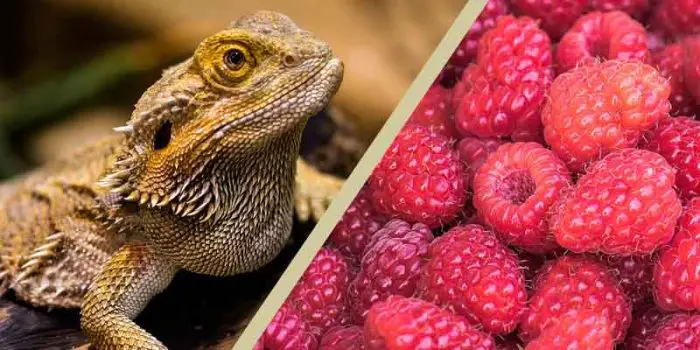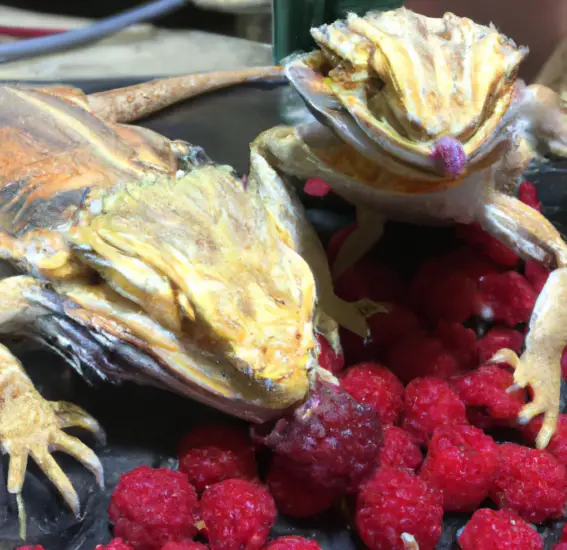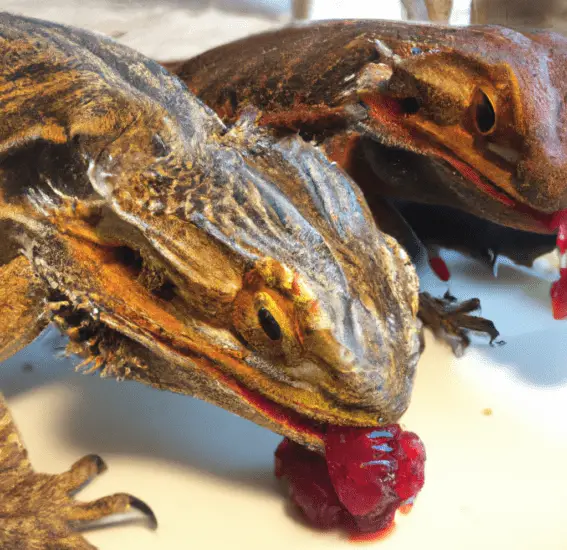
Can Bearded Dragons Eat Raspberries are popular reptile pets known for their docile nature and unique appearance. As a responsible bearded dragon owner, it’s essential to provide a balanced and nutritious diet to ensure the well-being of your scaly friend. While bearded dragons primarily consume insects and leafy greens, you may wonder if they can enjoy the occasional fruity treat. In this article, we will explore whether Can Bearded Dragons Eat Raspberries and discuss their nutritional benefits and potential risks.
Before delving into the specifics of raspberries, it’s crucial to understand the dietary requirements of bearded dragons. In the wild, these reptiles primarily feed on insects, such as crickets, and various greens, including collard greens and mustard greens. Their diet should consist of a balance between protein, vegetables, and fruits, providing the necessary vitamins, minerals, and hydration for their overall health.
Yes, bearded dragons can consume fruits, but it’s essential to offer them in moderation. While fruits contain natural sugars, they also provide valuable nutrients and antioxidants that can benefit your pet. However, not all fruits are suitable for bearded dragons, as some may be high in sugar or present other risks to their health. Let’s explore whether Can Bearded Dragons Eat Raspberries are a safe and nutritious option for your bearded dragon.
 Can Bearded Dragons Eat Raspberries
Can Bearded Dragons Eat Raspberries
Raspberries are a delightful summer fruit known for their vibrant color and sweet-tart flavor. They are packed with essential vitamins and minerals, making them a healthy addition to the human diet. However, when it comes to feeding raspberries to bearded dragons, it’s crucial to consider their nutritional composition.
Raspberries are low in fat and calories, which aligns well with the dietary needs of bearded dragons. They are an excellent source of dietary fiber, which aids in digestion. Raspberries also contain essential vitamins such as vitamin C, vitamin K, and folate, along with minerals like manganese and potassium.
Including raspberries in your bearded dragon’s diet can offer several health benefits. The high vitamin C content supports their immune system, helping them stay healthy and ward off illnesses. Raspberries also contain antioxidants that contribute to overall well-being and may help reduce the risk of certain diseases.
The dietary fiber in raspberries promotes healthy digestion and can prevent constipation, a common issue among bearded dragons. Additionally, the natural hydration provided by raspberries can be beneficial, especially during warmer weather.
While raspberries offer nutritional benefits, there are a few risks and considerations to keep in mind. The natural sugars present in fruits can cause digestive upset or diarrhea in bearded dragons if consumed in excess. It’s crucial to offer raspberries as an occasional treat and not as a staple part of their diet.
Another aspect to consider is the presence of oxalates in raspberries. Oxalates are naturally occurring compounds found in certain foods, including raspberries. In high amounts, oxalates can bind with calcium and form crystals, potentially leading to the development of kidney stones in reptiles. However, raspberries contain relatively low levels of oxalates, and when fed in moderation, they are unlikely to pose a significant risk.
To minimize potential health issues, always ensure that the raspberries you provide are fresh, ripe, and free from pesticides or other harmful substances. Wash them thoroughly before feeding them to your bearded dragon.
 Can Bearded Dragons Eat Raspberries
Can Bearded Dragons Eat Raspberries
If you decide to introduce raspberries into your Can Bearded Dragons Eat Raspberries diet, it’s important to do so gradually and observe how your pet responds. Start by offering small, bite-sized pieces of raspberry and monitor their digestion and overall well-being. If any adverse reactions occur, such as diarrhea or loss of appetite, discontinue feeding raspberries immediately.
Remember that raspberries should only be a part of a varied and balanced diet. The majority of your bearded dragon’s nutrition should come from gut-loaded insects and leafy greens. Use raspberries as an occasional treat, perhaps once or twice a month, and always in moderation.
While raspberries can be a safe fruit option for bearded dragons, it’s always beneficial to explore other suitable fruits to diversify their diet. Some fruits that you can consider feeding your bearded dragon include:
- Blueberries
- Papaya
- Mango
- Watermelon (seedless)
- Apples (remove seeds and core)
Remember to offer these fruits in small portions and as occasional treats to maintain a balanced diet for your bearded dragon.
In conclusion, bearded dragons can eat raspberries, but they should be offered in moderation. Raspberries provide valuable nutrients and antioxidants, along with dietary fiber for healthy digestion. However, the natural sugars and oxalates present in raspberries require caution.
As a responsible bearded dragon owner, prioritize a diet that consists primarily of gut-loaded insects and leafy greens. Use raspberries and other fruits as occasional treats to add variety and nutritional benefits to your pet’s diet. Always monitor their response and consult a reptile veterinarian if you have any concerns about their health or dietary needs.
Can Bearded Dragons Eat Raspberries
No, raspberries should be offered as an occasional treat, not as a daily food item. Their high sugar content can cause digestive issues if consumed excessively.
Yes, some fruits are high in sugars or contain toxic compounds. Avoid feeding your bearded dragon fruits like citrus fruits, grapes, and avocados.
It’s best to offer fresh raspberries to your bearded dragon. Frozen raspberries may lose some of their nutritional value and texture.
Wash raspberries thoroughly to remove any pesticides or contaminants. Cut them into small, bite-sized pieces before offering them to your pet.
While bearded dragons primarily consume the fruit, raspberry leaves are safe for them to eat. However, they should be provided in limited quantities as part of a varied diet.
